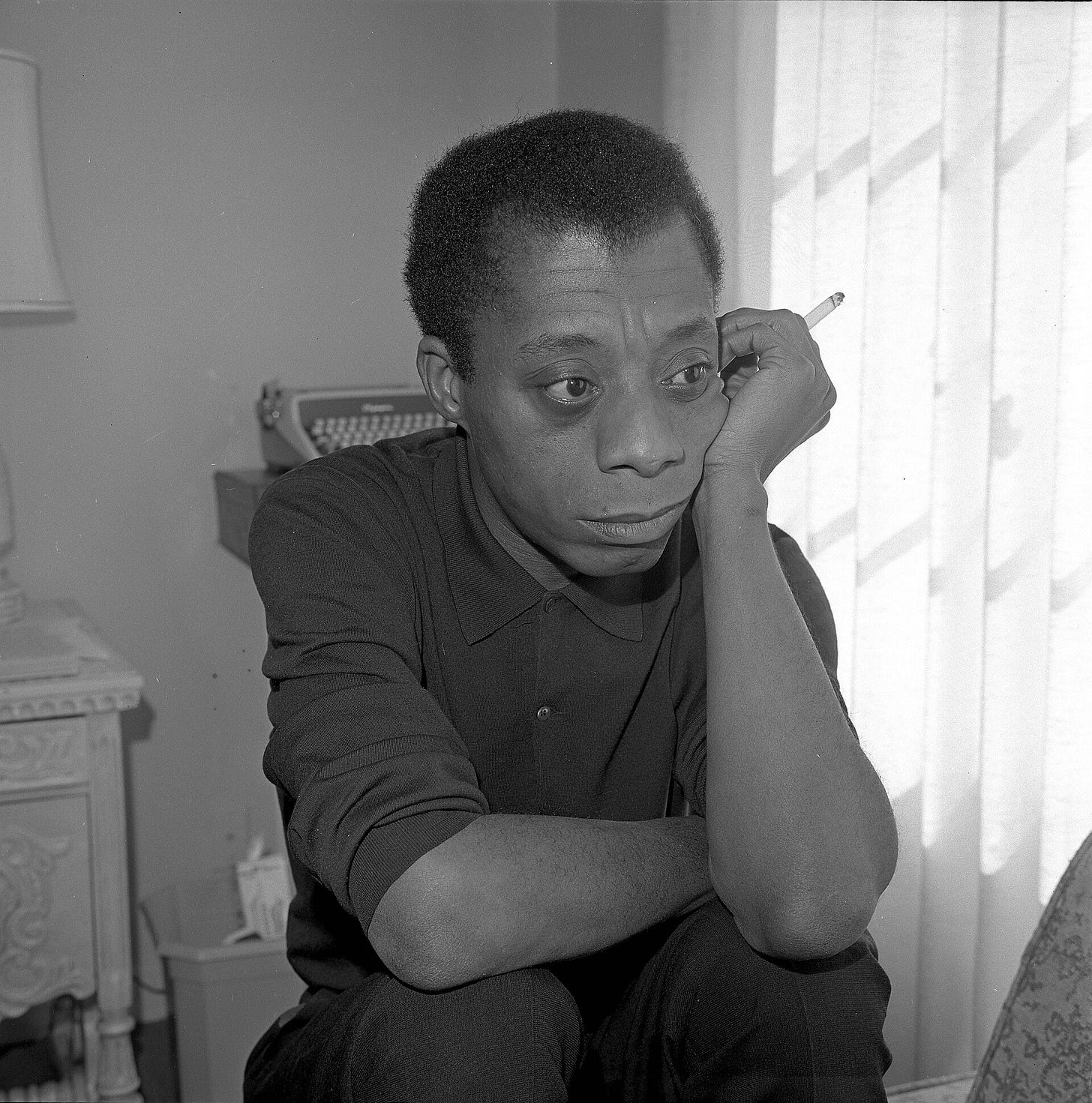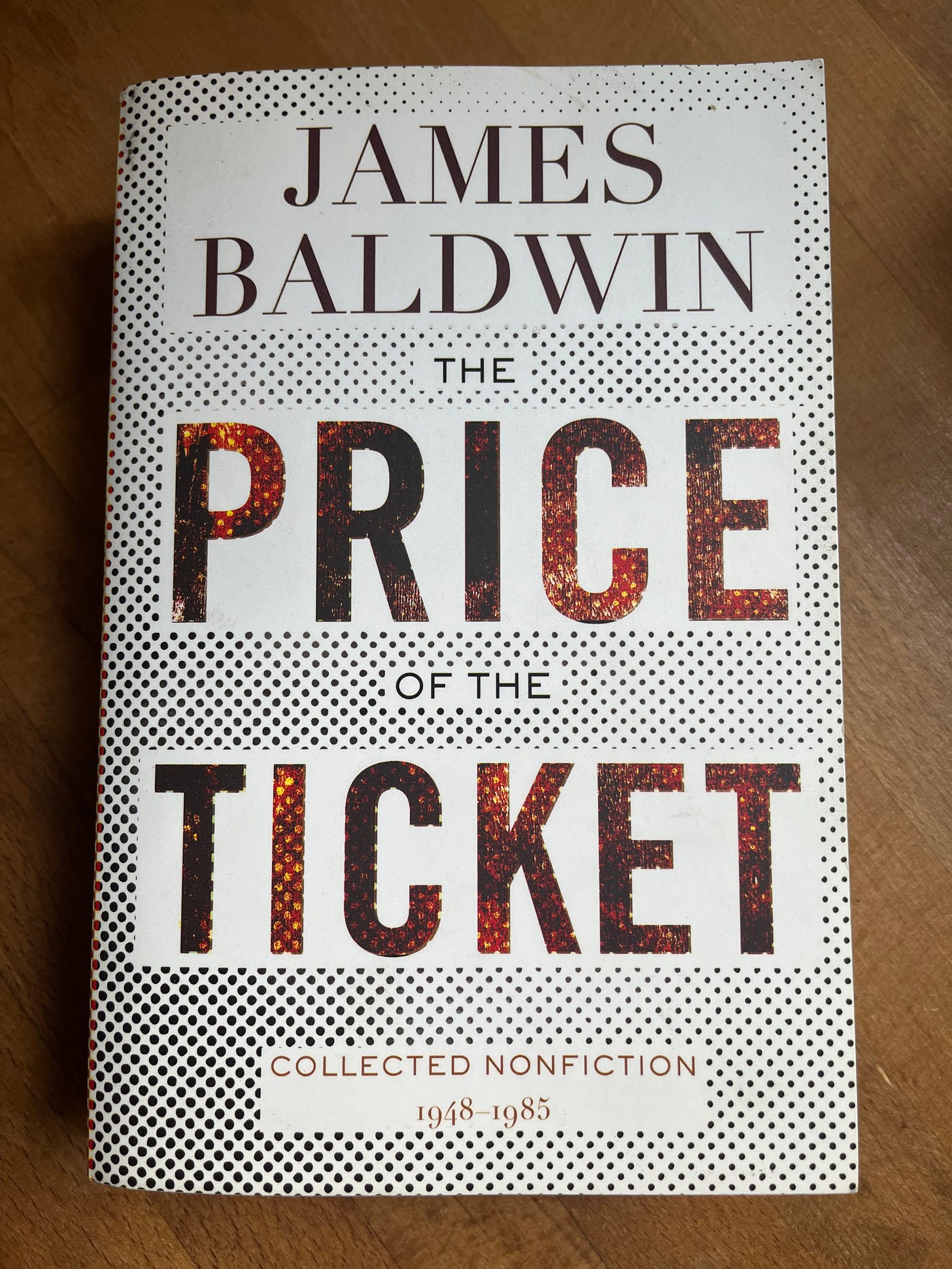Reading List: James Baldwin's THE PRICE OF THE TICKET
“The vast, unthinking, cruel majority…they don’t think I’m human. They have become moral monsters.”
James Baldwin has become one of the most iconic American writers of the last century. When I was a precocious literary-minded adolescent in the 1960s, Baldwin was best-known as a novelist. I eagerly read whatever fiction spoke to the time, so I checked out Another Country (1962) and Go Tell It On the Mountain (1953) from the library, though to be honest I retain almost nothing of what I read. They were as far from my experience as a peripatetic white Air Force brat as James Joyce’s Ulysses, which I also read and pretended to understand. Later, I read Giovanni’s Room, Baldwin’s legendary and brave-for-its-time (1956) gay novel. It was not the radiant, inspiring gay romance I imagined but a much more downbeat saga about life in the closet.
In recent years Baldwin’s prominence as social critic has eclipsed his status as novelist and playwright. Less familiar with his critical writing, I relied on random quotations here and there, scattered interviews, and documentaries such as Raoul Peck’s 2016 Oscar-nominated I Am Not Your Negro. Fortunately, last year Beacon Press brought out a new edition of The Price of the Ticket: Collected Nonfiction 1948-1985, which had been out of print for many years because of copyright issues.
I have found The Price of the Ticket to be an excellent companion through the last six months of American public life. It has been strangely consoling to process the fascist encroachments of the “Kiss My Billionaire Butt” reality-TV show while consuming, in short chunks, Baldwin’s unsentimental, sharp-eyed, dyspeptic prose. Black people hear and recognize the language being used these days to describe Spanish-speaking immigrants; ditto the demonization of Palestinians under the phony guise of combating anti-semitism. Baldwin’s ghost is lighting a cigarette, exhaling with a bitter flash of that gap-toothed grin, and saying, “So what else is new?”
The other day I posted a few paragraphs Baldwin wrote about power in 1972 that could have been written last week. Here are a few other passages that knocked me out with their prescience and made my soul settle, the way that happens when someone finds words for subtle or difficult truths.
It was impossible for Americans to accept the black man as one of themselves, for to do so was to jeopardize their status as white men. But not so to accept him was to deny his human reality, his human weight and complexity, and the strain of denying the overwhelmingly undeniable forced Americans into rationalizations so fantastic that they approached the pathological. (1953)
White people, who had robbed black people of their liberty and who profited by this theft every hour that they lived, had no moral ground on which to stand. They had the judges, the juries, the shotguns, the law – in a word, power. But it was a criminal power, to be feared but not respected, and to be outwitted in any way whatever. (1962)
Harlem and every ghetto in this city – every ghetto in this country – is full of people who live outside the law. They wouldn’t dream of calling a policeman. They wouldn’t, for a moment, listen to any of those professions of which we are so proud on the fourth of July. They have turned away from this country forever and totally. They live by their wits and really long to see the day when the entire structure comes down…. The point of all this is that black men were brought here as a source of cheap labor. They were indispensable to the economy. In order to justify the fact that men were treated as though they were animals, the white republic had to brainwash itself into believing that they were, indeed, animals and deserved to be treated like animals…it was not an accident, it was not an act of God, it was not done by well-meaning people muddling into something which they didn’t understand. It was a deliberate policy hammered into place in order to make money from black flesh. And now, because we have never faced this fact, we are in intolerable trouble. (1963)
Baldwin famously moved from New York, where he was born and raised, to Paris in 1948 at the age of 24 to give himself the freedom to write, to find himself creatively as well as sexually.
In 1952, I was in America, just in time for the McCarthy era. I had never seen anything like it. If I had ever really been able to hate white people, the era of that dimwitted, good-natured, flamboyant representative of the American people would have been pure heaven: for, not even the most vindictive hatred could have imagined the slimy depths to which the bulk of white Americans allowed themselves to sink: noisily, gracelessly, flatulent and foul with patriotism. Though cowardice was certainly the most vividly recognizable color in the tapestry, it was not mere cowardice one was watching, but something much worse, an absolute panic, absolutely infantile. (1976)
The same year, Baldwin wrote retrospectively about the Korean War, which he refers to as “the disaster in Korea.”
American error being unthinkable, and American might not to be questioned, the disaster could be explained away only by a species of inside interference: American was not being defeated, it was being betrayed, by disloyal Americans. A disloyal American was any American who disapproved of the course his government was taking… A disloyal American was anyone who really believed in equal justice under the law… A disloyal American was anyone who believes it his right, and his duty, to attempt to feed the hungry, and clothe the naked, and visit those in prison, and he may have been fingered, so to speak, by any Southern senator: he was certainly being scrutinized by the late, and much lamented, J. Edgar Hoover, history’s most highly paid (and most utterly useless) voyeur.
Like most writers, Baldwin couldn’t make a living from his fiction alone so especially in the early years he worked as a journalist. The Price of the Ticket includes his fascinating descriptions of spending time with Martin Luther King, Jr., Malcolm X, and other black leaders — plus, you know, Ingmar Bergman because why not? It also incorporates his often extremely prickly book reviews. Here he is, writing in 1954, about Andre Gide’s Madeleine, a memoir about his complicated marriage to his cousin:
The really horrible thing about the phenomenon of present-day homosexuality, the horrible thing which lies curled like a worm at the heart of Gide’s trouble and his work and the reason that he so clung to Madeleine, is that today’s unlucky deviate can only save himself by the most tremendous exertion of all his forces from falling in to an underworld in which he never meets either men or women, where it is impossible to have either a lover or a friend, where the possibility of genuine human involvement has altogether ceased. When this possibility has ceased, so has the possibility of growth….And again: It is one of the facts of life that there are two sexes, which fact has given the world most of its beauty, cost it not a little of its anguish, and contains the hope and glory of the world. And it is with this fact, which might better perhaps be called a mystery, that every human being born must find some way to live. For, no matter what demons drive them, men cannot live without women and women cannot live without men.
Given the power of Baldwin’s sometimes prophetic prose, it’s also something of a relief to discover that he was also capable of writing such complete nonsense (albeit parroting the sexual mores and gender politics of his time, cf. Giovanni’s Room).
Baldwin loved movies, and it’s fun to revisit The Devil Finds Work, a slim volume of the essays in which he writes with tremendous seriousness about what now seem like trashy Hollywood movies. It’s fascinating, for instance, to follow along as he picks apart, scene by scene, the movie version of Billie Holiday’s memoir Lady Sings the Blues starring Diana Ross, Richard Pryor (whom Baldwin respected), and Billy Dee Williams (who he was hoping would play Malcolm X in an adaptation of Malcolm’s autobiography that never got made). Baldwin knew Holiday, of course, so writes authoritatively about how the film cheats and distorts her story to fit Hollywood’s cynical views of how much truth about black lives white moviegoers could handle.
Baldwin could also be very funny and pithy. “The moment I began living in French hotels I understood the necessity of French cafes.” Discussing black standards of beauty as demonstrated in Harlem nightclubs, he writes, “The entire scene is rich and funny and sad, and both bound and free, like the heavy and resplendent matron wearing a complete Easter outfit, from head almost to toe, but with her shoes in her hand and her slippers on her feet. She had the shoes and she wanted everyone to know it; but her feet hurt. And she didn’t care who knew that.”
In the Raoul Peck documentary, we hear Baldwin’s words intoned by the suitably oracular Samuel L. Jackson: “The story of the Negro in America is the story of America. It is not a pretty story.” The Price of the Ticket makes that perfectly clear on almost every one of its 703 pages. As he wrote in “Notes of a Native Son” (1955), “There is not a Negro alive who does not have this rage in his blood – one has the choice, merely, of living with it consciously or surrendering to it. As for me, this fever has recurred in me, and does, and will until the day I die.”
If you are enjoying these posts, please consider becoming a subscriber. All eyes are welcome, and I especially appreciate paid subscriptions. They don’t cost much — $5/month, $50/year — but they encourage me to continue sharing words and images that are meaningful to me. If it helps, think of a paid subscription as a tip jar: not mandatory but a show of appreciation.





